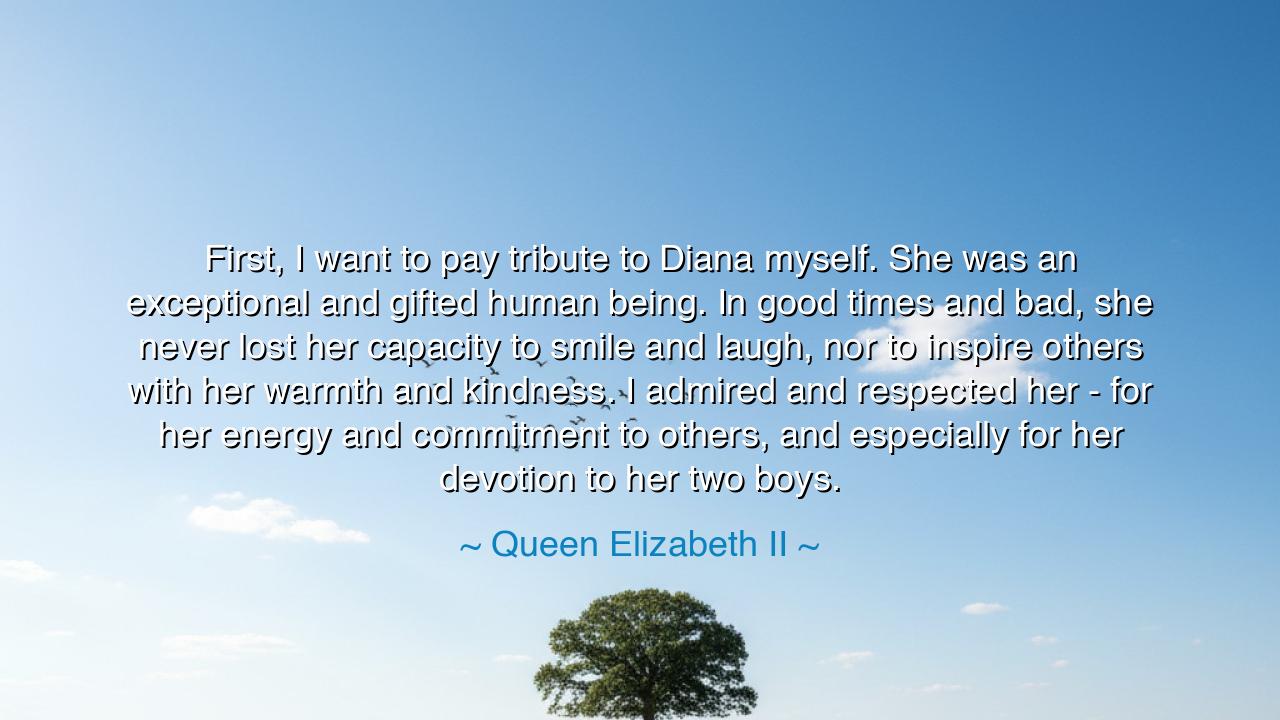
First, I want to pay tribute to Diana myself. She was an
First, I want to pay tribute to Diana myself. She was an exceptional and gifted human being. In good times and bad, she never lost her capacity to smile and laugh, nor to inspire others with her warmth and kindness. I admired and respected her - for her energy and commitment to others, and especially for her devotion to her two boys.






The words of Queen Elizabeth II, “First, I want to pay tribute to Diana myself. She was an exceptional and gifted human being. In good times and bad, she never lost her capacity to smile and laugh, nor to inspire others with her warmth and kindness. I admired and respected her – for her energy and commitment to others, and especially for her devotion to her two boys,” rise like a solemn hymn of remembrance. In these words, the Queen does more than honor a princess; she unveils a truth about the power of the human spirit, a truth as ancient as sorrow and as enduring as love.
At the heart of this tribute is the reminder that true greatness does not reside in crowns, jewels, or thrones, but in the ability to smile in adversity and to inspire through kindness. Diana, often called the “People’s Princess,” carried within her a gift that the ancients would have named divine: the power to comfort the suffering, to give joy to the lonely, to be present for the vulnerable. Her ability to smile even in the midst of storm and scandal was not naivety, but a heroic defiance of despair. She showed that light can shine even when shadows press close.
The Queen’s words also speak to Diana’s devotion as a mother. Though she was known across the earth, Diana poured her heart into the raising of her two sons, William and Harry. Her love was fierce, protective, and tender, and it is this devotion that even the Queen, with her own life shaped by duty and distance, singled out as her deepest admiration. For in all cultures and all ages, the devotion of a parent to their children has been seen as a sacred calling, greater even than kingship. Diana lived that calling with joy and with sacrifice.
History is filled with those who, like Diana, bore hardship yet chose compassion. Think of Florence Nightingale, who walked among the wounded in the filth of war, bringing not only medicine but also warmth and kindness to soldiers who despaired of life. Like Diana, she became a figure of light in dark places, remembered not for grandeur but for the humanity she carried into every encounter. Such women reveal to us that the true measure of greatness is not the power to command, but the power to comfort.
The Queen’s tribute also holds a lesson in reconciliation. For the relationship between Elizabeth and Diana was known to be complex, sometimes strained by the weight of tradition and the unpredictability of Diana’s spirit. Yet in the hour of remembrance, the Queen chose not division, but honor. She acknowledged Diana’s energy, commitment, and warmth—virtues that no quarrel or misunderstanding could erase. In this, the Queen herself models the ancient virtue of magnanimity: the greatness of soul that pays tribute even when bonds were tested.
The lesson for us, then, is this: let us not measure lives by titles or perfection, but by their capacity to inspire, to love, and to endure with grace. To smile in hardship, to bring warmth to others, to devote oneself to family—these are the legacies that time will never erase. Diana embodied them, and for this reason, she remains in the hearts of millions long after her passing.
To practice this wisdom, begin with small acts. When trials come, do not surrender to bitterness, but, like Diana, lift your face with courage. Offer warmth even when your own heart is weary. Cherish your family, and give yourself to them fully, for in that devotion lies a legacy greater than any monument. And when you speak of others—especially those with whom you have known hardship—choose words of honor, as the Queen did, for such words heal and uplift.
So remember, O children of tomorrow: the greatest tribute is not carved in stone nor etched in crowns, but spoken in the memory of lives lived with smiles, laughter, kindness, and devotion. These are the treasures that endure beyond death, shining forever in the hearts of those who remain. And it is these treasures, carried by Diana, that Queen Elizabeth II raised up, so that future generations might know what true greatness looks like.






AAdministratorAdministrator
Welcome, honored guests. Please leave a comment, we will respond soon